 Pirates and Privateers Pirates and Privateers
The History of Maritime
Piracy
Cindy Vallar, Editor
& Reviewer
P.O. Box 425,
Keller, TX 76244-0425
    
Stede Bonnet (continued)
'Give me Liberty or
Give me Death!'
On 30 October 1718, Attorney General
Richard Allein addressed the jury. He
explained what constituted piracy and
recapped how the defendants came to be
standing in the dock. Then he stressed
what was expected of them as they sat in
judgement.
 You are bound by your
Oaths, and are obliged to act
according to the Dictates of your
Consciences, to go according to the
Evidence that shall be produced
against the Prisoners, without Favour
or Affection, Pity or Partiality to
any of them, if they appear to be
guilty of those Crimes they are
charged with. And you are not allowed
a latitude of giving in your Verdict
according to Will and Humor. (Tryals,
9) You are bound by your
Oaths, and are obliged to act
according to the Dictates of your
Consciences, to go according to the
Evidence that shall be produced
against the Prisoners, without Favour
or Affection, Pity or Partiality to
any of them, if they appear to be
guilty of those Crimes they are
charged with. And you are not allowed
a latitude of giving in your Verdict
according to Will and Humor. (Tryals,
9)
Since some
residents within Charles Town seemed to
sympathize with these ne’er-do-wells,
Allein made a point of explaining why such
thinking was wrong. Especially if it
concerned Stede Bonnet.
I am sorry to hear some
Expressions drop from private Persons,
(I hope there is none of them upon the
Jury) in favour of the Pirates, and
particularly of Bonnet; that he is a
Gentleman, a Man of Honour, a Man of
Fortune, and one that has had a
liberal Education. Alas, Gentlemen,
all these Qualifications are but
several Aggravations of his Crimes.
How can a Man be said to be a Man of
Honour, that has lost all Sense of
Honour and Humanity, that is become an
Enemy of Mankind, and given himself up
to plunder and destroy his
Fellow-Creatures, a common Robber, and
a Pirate?
Nay, he was
the Archipirata . . . or
the chief Pirate, and one of the first
of those that began to commit those
Depredations upon the Seas since the
last Peace.
I have an
Account in my hand of above
twenty-eight Vessels taken by him, in
company with Thatch, in the West-Indies, since the
5th Day of April last; and how many
before, no body can tell.
His Estate
is still a greater Aggravation of his
Offence, because he was under no
Temptation of taking up that wicked
Course of Life.
His
Learning and Education is still a far
greater; because that generally
softens Mens Manners, and keeps them
from becoming savage and brutish: but
when these Qualifications are
perverted to wicked Purposes, and
contrary to those Ends for which God
bestows them upon Mankind, they become
the worst of Men, as we see the
present Instance, and more dangerous
to the Commonwealth. (Tryals,
9-10)
Thomas Hepworth
spoke as well. In addition to doing their
duty, he advised the jury to reflect on
just what kind of nuisance pirates in
general had been to Charles Town and its
trade. He also made known what he thought
of these men, who had taken the King’s
pardon and then resumed pillaging.
[C]onsider how long our
Coasts have been infested with
Pirates, (for the name of Men they do
not deserve) and how many Vessels they
have taken and pillag’d belonging to
this Place, as well as multitudes of
others belonging to divers parts of
his Majesty’s Dominions, and how many
poor Men in whose Blood they have
imbru’d their hands with the greatest
Inhumanity imaginable, and how many
poor Widows and Orphans they have
made, and how many Families they have
ruin’d, and how long they have gone on
in their abominable Wickedness: Nay,
do but consider how those very Pirates
lately insulted this Government, when
they sent for Medicines, threatning to
destroy our Vessels and Men in case of
refusal; nay, since these have
accepted of Certificates from the
Government of North Carolina,
like Dogs to their Vomits, they have
returned to their old detestable way
of living, and since taken off these
Coasts thirteen Vessels belonging to British
Subjects. (Tryals, 11)
When he
finished, the Crown called Ignatius
Pell to the stand. Although a pirate
himself, he had received clemency in
exchange for testifying against his mates.
He had been held with Stede and David
Herriot, but no evidence has shown why he
didn’t escape with them. The most logical
reason would be that he was free to go
about his business once he testified, and
he wasn’t about to jeopardize that
liberty. Pell had served as Revenge’s
boatswain at least since they “came from
the Bay of Honduras.” (Tryals, 11)
He was also one of the men marooned by
Thache.
Maj. Bonnet came
with the Boat, and told us, as we were
on a Marroon Island, that he was going
to St. Thomas’s to get a
Commission from the Emperor to
go against the Spaniards a
Privateering, and we might go with
him, or continue there: so we having
nothing left, was willing to go with
him. (Tryals, 11)
Pell then
recounted the various prizes taken and the
plunder “traded.” He also made mention
that “Reeve’s Wife . . . and Captain
Read’s Son . . . we sent them on shore.”
Captain Manwareing, however, remained a
prisoner for “[a]bout ten Weeks.” (Tryals,
12)
The pirates being tried that first day
were given the opportunity to question the
witness, but none did. So, the clerk of
the court called Captain Thomas Read to
the stand. First, he testified about a
capture that he witnessed.
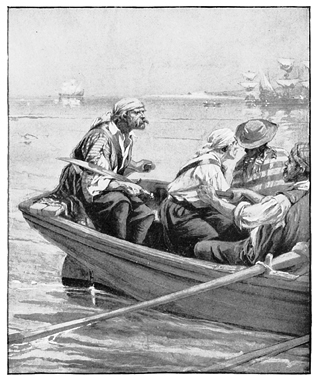 The Sloop
Revenge was at an Anchor, and
the Scooner lay a long-side of her. I
was then a Prisoner on board of the
Sloop Revenge. In the Evening
we saw a Sloop coming into the Bay,
and Major Bonnet sent off
five Hands with the Dory; and about an
Hour after they came on board the Revenge,
and brought Capt. Manwareing.
. . . Major Bonnet demanded
his Papers; and he gave them to him.
He asked him from whence he came? He
answered from Antegoa, and
bound for Boston. He asked him
what he had on board? He told him.
(Tryals, 12) The Sloop
Revenge was at an Anchor, and
the Scooner lay a long-side of her. I
was then a Prisoner on board of the
Sloop Revenge. In the Evening
we saw a Sloop coming into the Bay,
and Major Bonnet sent off
five Hands with the Dory; and about an
Hour after they came on board the Revenge,
and brought Capt. Manwareing.
. . . Major Bonnet demanded
his Papers; and he gave them to him.
He asked him from whence he came? He
answered from Antegoa, and
bound for Boston. He asked him
what he had on board? He told him.
(Tryals, 12)
When the clerk
of the court asked the prisoners if they
wanted to question Read, they replied, “We
desire nothing, but that he would speak
the Truth.” (Tryals, 13)
Next up was Captain Peter Manwareing, who
filled in the gaps of his taking.
When they came on board us,
we were at an Anchor. About Eight or
Nine of the clock in the Evening we
saw the Canoo coming: I ordered my Man
to hale them. He asked from whence
they came, and what Sloops they were?
They answered, Capt. Thomas
Richards from St. Thomas’s,
and Capt. Read from Philadelphia.
So we were glad to hear it; so hoped
all was well. But as soon as they came
up the Shrowds, they clapp’d their
Hands to their Cutlashes. Then I saw
we were taken: And I said, Gentlemen,
I hope, as you are Englishmen,
you’ll be merciful; for you see we
have nothing to defend our selves.
They told us they would, if we were
civil. (Tryals, 13)
The man who
actually allowed the pirates to come
aboard Manwareing’s sloop was James
Killing, the mate.
The Thirty first of July,
between Nine and Ten of the clock,
there running a strong Tide of Ebb, we
came to an Anchor about fourteen
Fathom of Water near Cape James.
In about half an Hour’s time I
perceived something like a Canoo . . .
I ordered the Men to hand down a Rope
to them [the pirates]. So soon as they
came on board, they clapp’d their
Hands to their Cutlashes; and I said
we are taken. So they curs’d and swore
for a Light. I ordered our People to
get a Light as soon as possible. So
they ordered our Captain immediately
to go on board the Revenge;
and accordingly was sent with two of
their own Hands; and I saw him no more
that Night. So when they came into the
Cabin, the first thing they begun with
was the Pine-Apples, which they cut
down with their Cutlashes. They asked
me if I would not come and eat along
with them? I told them I had but
little Stomach to eat. They asked me,
why I looked so melancholy? I told
them I looked as well as I could. They
asked me what Liquor I had on board? I
told them some Rum and Sugar. So they
made Bowls of Punch, and went to
Drinking of the Pretender’s Health,
and hoped to see him King of the English
Nation: Then sung a Song or two. (Tryals,
13)
With the Crown
having proven their case, Judge Trott
spoke.
You the Prisoners at the
Bar stand charged with Felony and
Piracy . . . The Evidences have
proved it home upon you . . . so that
it appears all of you took up with
this wicked Course of Life out of
Choice . . . what have you to say in
your Defence? (Tryals, 14)
Robert Tucker
and Edward
Robinson spoke of Stede’s offer to
go privateering. Neal Paterson was a bit
more vocal on what he experienced.
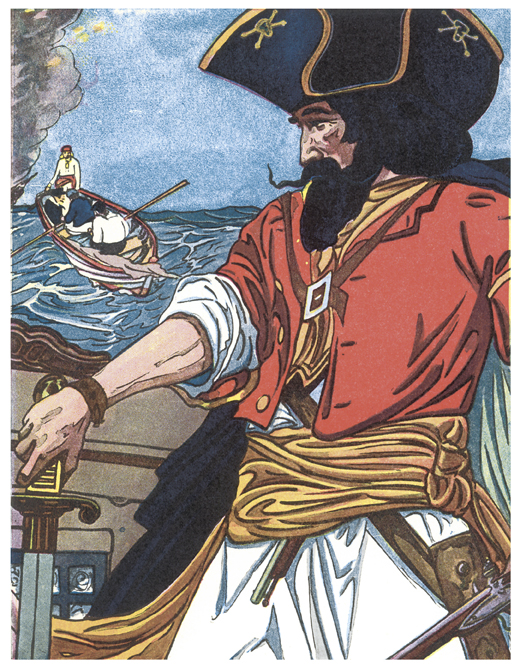 Thatch came on
board and carried away fourteen of our
best Hands, and marooned twenty-five
of us on an Island; and Maj. Bonnet came and
told his he was minded to go . . . a
privateering against the Spaniards; so I was
willing to go with him, and when I was
on board, he forced me to do what he
pleased, for it was against my will. Thatch came on
board and carried away fourteen of our
best Hands, and marooned twenty-five
of us on an Island; and Maj. Bonnet came and
told his he was minded to go . . . a
privateering against the Spaniards; so I was
willing to go with him, and when I was
on board, he forced me to do what he
pleased, for it was against my will.
Judge
Trott. Did not Thatch carry away
your Money and what you had besides of
Goods?
N.
Paterson. Yes.
Attor.
Gen. Was you not all ashore when
you received the Act of Grace?
N.
Paterson. Yes, Sir.
Attor.
Gen. Why had you not continued
ashore? Why did you join with Bonnet? or who
forc’d you to it?
N.
Paterson. But, Sir, it was in a
strange Land, and I had no Money, nor
nothing left, and I was willing to do
something to live; but it was against
my will to go a pirating.
Judge
Trott. If you were forced, and
took only Provisions, pray how did you
come to share so much Money and Goods
afterwards? . . .
N.
Paterson. I could not hinder the
rest from doing what they pleased; but
it was contrary to my Inclination. (Tryals,
14)
Unimpressed,
Judge Trott moved on to the next pirate.
He and the remaining defendants gave
similar responses, although Job Bayley’s
response to Trott’s question on why he
fought Colonel Rhett was “We thought it
had been a Pirate.” (Tryals, 15)
The judge’s disdain could be sensed in his
reply: “[H]ow could you think it was a
Pirate, when he had King George’s
Colours?” (Tryals, 15)
After this, the jury retired to consider
their verdict. They sequestered themselves
for two hours before rendering it. Job
Bayley, Neal Paterson, Edward Robinson,
William Scot, and Robert Tucker were found
guilty.
Eight more pirates were brought in: Samuel
Booth, Thomas Carman, William Hewet, John
Levit, William Livers, William Morrison,
John William Smith, and John Thomas. These
men would be tried by a different jury.
Each of the previous witnesses returned
and gave their testimonies.
When it came to speaking for themselves,
several pirates spoke. Smith did say that
what pirating he did “was against my
Will.” (Tryals, 16) Carman tried to
prove his innocence, saying Thache had
forced him into piracy. The only reasons
he went on board Stede’s vessel were
because he “shewed me the Act of Grace”
and “to get my Bread, in hopes to have
went where I might have had Business,” and
he “had not signed the Articles” before
they departed Topsail Inlet. Ignatius Pell
countered with “But you gave the Captain
your word that you would.” (Tryals,
16)
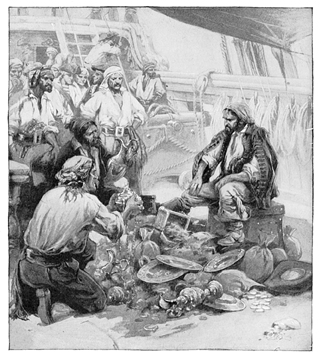 Thomas swore he had also
been forced after being pardoned; the only
problem was that he accepted his share of
the loot when the booty was divided. The
same was true for Livers. When the pirates
did speak up for themselves, their words
tended to condemn them rather than help
them. Thomas swore he had also
been forced after being pardoned; the only
problem was that he accepted his share of
the loot when the booty was divided. The
same was true for Livers. When the pirates
did speak up for themselves, their words
tended to condemn them rather than help
them.
In addressing the jury this time, Trott
said: “Gentleman of the Jury, I think I
need say but little on this matter.” (Tryals,
17) After which the jurors retired to
consider their verdict. Each defendant was
found guilty.
The next trial began on Friday morning, 31
October 1718. The men standing in the dock
this time were Alexander Annand, George
Dunkin, William Eddy, Matthew King, Thomas
Nichols, Daniel Perry, John Ridge, George
Ross, and Henry Virgin. While the pirates
were different, the jury, the witnesses,
and the evidence for the third trial were
the same as the first. The one exception?
Defendant Nichols’s actions differed from
those of the others.
Ignatius Pell declared,
that Nichols . . . was very
much discontented; but Maj. Bonnet
said he would force him to go.
However, he would not join with the
rest of the Men, but always separated
himself from the Company.
Capt. Read said, that
Nichols behaved
himself different from the rest, and
did not join with them.
Capt. Manwareing
said, that
Nichols . . . said
. . . he hoped to get clear of them,
and looked very melancholy, and never
joined with the rest in their Cabals
when they were drinking: and when Maj.
Bonnet sent for
him, he refused to go, and said, he
would die before he would fight.
. . .
Killing.
. . . he told me, he would give the
whole World if he had it, to be free
from them; and when . . . Maj. Bonnet
sent for him, he refused to go . . .
till he sent to fetch him by force,
and then he told me he would not fight
if he did lose his Life for it: and he
was not with them when they shared . .
. and he never was at their Cabals, as
the rest were. (Tryals, 18)
On hearing all
these witnesses, Judge Trott believed that
Nichols had been forced. When Eddy tried
to use a similar defense, Trott scoffed at
his “I never acted in it.” The judge told
the defendant,
That is no Excuse: it is
not such or such a one that goes on
board only, but those that stand ready
to assist them, have as great a hand
in the Fact as the other; for Men
would not be taken by two or three, if
they had no more help: so that the
whole Crew are equally concern’d at
such a time. (Tryals, 18)
Annand thought
he would die if he had not joined; the
others put forth mitigating factors, but
based on their answers to questions put to
them, they proved themselves to be as
culpable as Eddy according to Judge
Trott’s line of thinking.
This time, when the jury returned from its
deliberations, they found all but one
defendant guilty of the charges against
them. Thomas Nichols was deemed “Not
Guilty.” (Tryals, 20)
The next batch of pirates to be tried were
Zachariah Long, John Lopez, James Mullett,
James Robbins, Thomas Price, and James
Wilson. Wilson pleaded guilty, so he was
returned to the Watch
House. The rest listened to each
witness who took the stand. Again, the
witnesses and the proceedings were a
repeat of the previous trials. Robbins
said in his defense that “I was on board
the Revenge, and then I was sent
on board of Capt. Read’s Sloop,
and was there four Days; and then was sent
on board the Revenge again. So I
was about to run away, if I had an
Opportunity.” (Tryals, 20) His
defense proved sufficient because the jury
came back with a verdict of innocence; the
others were guilty.
A bystander might expect that sentences
would be pronounced next; instead, the
pirates faced second trials, this time for
the seizure of Captain Thomas Read’s
sloop. The first was held on Saturday
morning and pertained to the participation
of Bayley, Carman, Paterson, Robinson,
Scot, Smith, Tucker, and Thomas. The same
jury that had sat in judgment of them the
first time, did so this time as well. The
evidence given was basically the same; so
was what the pirates had to say for
themselves. Again, all were judged guilty
of the charged crime.
The next group was brought before the
bench the same day. The same members of
the jury from the first session heard this
case too. The evidence presented was much
the same as earlier, but Thomas Nichols’s
behavior and actions became a focal point.
Pell informed the court that “Nichols was
very much dissatisfied . . . and did not
join with the rest of the Company, and
would not take the Share . . . .” (Tryals,
24)
As for Manwareing, he said,
When Nichols was
on board my Sloop, he said several
times he would get clear of them the
first Opportunity, and he hoped it
would not be long first; and when
Major Bonnet sent for all
Hands on board the Revenge, he refused
to go, till he sent word, If he would
not come, he would make him; and when
he went, he said, Before he would
fight, he would die: and he always
kept himself from the Company, and
from their Cabals. (Tryals,
24)
Once again,
Killing and Captain Read concurred with
the other witnesses’ testimonies. The only
difference this time around was that
George Dunkin kept trying to convince the
jury that his case was similar to
Nichols’s. In fact, Read initially
considered him to be a captive of the
pirates, but the longer he was with them,
the less he believed this to be so. Pell
verified that Dunkin did accept a share of
the plunder. When given the chance to
offer a defense, Dunkin provided a
“Testimony of his former Behaviour when in
Scotland.” (Tryals, 26) Regardless,
the outcome of this trial was the same:
all but Nichols were deemed guilty.
The court reconvened on Monday, 3 November
to try Long, Lopez, King, Mullet, Perry,
Price, Ridge, Robbins, Virgin, and Wilson.
There were a few minor differences with
this trial. Three jurors were new. There
was a new witness, Francis Griffin. What
remained the same was that all the pirates
were found guilty.
Next to be tried were Robert Boyd, John
Brierly, Jonathan Clarke, Thomas Gerrard,
and Rowland Sharp. They all denied being
guilty of the charges. Manwareing, and the
other witnesses to lesser degrees,
testified that “my Man Garrard .
. . told me, he was not able to bear any
longer, but was forced to comply with
them, for they told him they would . . .
make a Slave of him; but he did not
receive any of their Goods: and when he
was at home, he had the Character of an
honest Man, and fought for his King and
Country.” (Tryals, 30)
Brierly claimed not to have participated
in piracy.
Mr. Boyd and I was in a
leaky Canoo, and we were afraid she
would sink . . . I stood up and . . .
saw . . . a Vessel . . . They sent off
their Dory, and asked if we would
consent to go with them? And we said
no: but they said they would break the
Canoo . . . they made me consent to go
on board the Revenge, but I
never joined myself while I was on
board: and then I was ordered on board
Capt. Manwareing, and there I
worked; but I never bore Arms, nor did
not fight Col. Rhett. (Tryals,
30)
Sharp also
claimed to have been forced.
After I was taken, I went
on shore, and travell’d four days in
the Woods without eating or drinking,
and could find the way to no
Plantation, and so was forced to
return again, and I refused to sign
the Articles; and one of the Men came
and told me I was to be shot . . . but
I was resolved to make my escape the
first Opportunity. (Tryals,
30)
Clarke’s story
was similar. He refused to sign the
articles or work the pumps, even though
that was the task assigned to him. If he
didn’t comply, Stede “told me . . . he
would make me Governor of the first Island
he came to; for he would put me ashore,
and leave me there.” (Tryals, 30)
This time, when the jury revealed their
verdicts, Clarke, Gerrard, and Sharp were
innocent. Brierly and Boyd were condemned.
These same pirates faced their second
trial on Tuesday, 4 November. This time
around only Brierly was found guilty.
The next day, all the pirates were brought
before Judge Trotter and the rest of the
vice-admiralty court. All of those named
below had been judged guilty of at least
one act of piracy. (One was sufficient to
earn the hangman’s noose.)
Pirate
|
Home Port
|
| Alexander Annand |
Jamaica |
| Job Bayley |
London, England |
| Samuel Booth |
Charles Town, South
Carolina |
| Robert Boyd |
Bath Town, North
Carolina |
| John Brierly |
Bath Town, North
Carolina |
| Thomas Carman |
Maidstone, Kent, England |
| George Dunkin |
Glasgow, Scotland |
| William Eddy |
Aberdeen, Scotland |
| William Hewet |
Jamaica |
| Matthew King |
Jamaica |
| John Levit |
North Carolina |
| William Livers |
Dublin, Ireland |
| Zachariah Long |
Holland, The Dutch
Republic |
| John Lopez |
Oporto, Portugal |
| William Morrison |
Jamaica |
| James Mullet |
London, England |
| Neal Paterson |
Aberdeen, Scotland |
| Daniel Perry |
Guernsey, Channel
Islands |
| Thomas Price |
Bristol, England |
| John Ridge |
London, England |
| James Robbins |
London, England |
| Edward Robinson |
Newcastle upon Tyne,
England |
| George Ross |
Glasgow, Scotland |
| William Scot |
Aberdeen, Scotland |
| John-William Smith |
Charles Town, South
Carolina |
| John Thomas |
Jamaica |
| Robert Tucker |
Jamaica |
| Henry Virgin |
Bristol, England |
| James Wilson |
Dublin, Ireland |
In his address
to these men, Judge Trott said,
You cannot but acknowledge
that you have all . . . had a fair and
indifferent Tryal.
You were
fully heard, not only as to all you
could pretend to say in your own Defences, but also
as to what you alledge in Mitigation of your
Crimes.
And
indeed, when you saw that the Facts
laid in the Indictments were
so fully proved against you, tho most
of you pleaded Not Guilty . .
. yet in the open Court . . . most of
you acknowledged the Facts charged
upon you. Therefore no one can think
but that you were all . . . justly
found Guilty; and your own
Consciences will oblige you to
acknowledge the same. (Tryals,
34)
He went on to
talk about the wayward path they had
followed, quoting apt scripture to
emphasize certain points. He hoped they
would take what little time was left to
them to truly consider what they had done
and to truly repent, for that was the only
way in which their souls would be
redeemed.
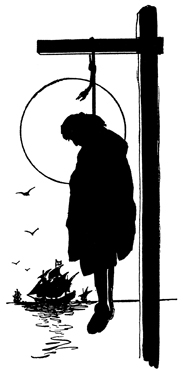 Thus having discharged
my Duty to you as a Christian . . . I
must now do my Office as a Judge. Thus having discharged
my Duty to you as a Christian . . . I
must now do my Office as a Judge.
The Sentence that the
Law hath appointed to pass upon you
for your Offences, and which this
Court doth therefore award, is,
That you . .
. shall go from hence to the place from
whence you came, and from thence to the
place of Execution, where you shall be
severally hanged by the Neck, till you
are severally dead.
And the God
of infinite Mercy be merciful to every
one of your Souls. (Tryals, 36)
Also present
were Jonathan Clark (Charles Town, South
Carolina), Thomas Gerrard (Antigua),
Thomas Nichols (London, England), and
Rowland Sharp (Bath Town, North Carolina).
Since they had been found not guilty, they
were permitted to walk free.
Three days later, on Saturday 8 November,
the condemned prisoners were taken to White
Point and executed.6
Just Desserts
 So,
where was Stede Bonnet all this time? He
and David Herriot opted to make their
getaway during the night of 24 October,
three weeks after their arrest. Stede did
it in style by donning women’s attire
before they slipped away from Provost
Marshal Partridge’s home.7
Of course, rumors of collusion immediately
surfaced. How else could the pair have
escaped? Although no evidence was found,
it was thought the sentries had been
bribed to look the other way. At the very
least, one abettor in the escape was a
local resident named Richard
Tookerman. He provided Stede and
Herriot with firearms, ammunition, and a
canoe as well as the three slaves to row
it. When Governor Johnson’s offer of a
reward failed to produce results, he
summoned Colonel Rhett to track down Stede
and David. So,
where was Stede Bonnet all this time? He
and David Herriot opted to make their
getaway during the night of 24 October,
three weeks after their arrest. Stede did
it in style by donning women’s attire
before they slipped away from Provost
Marshal Partridge’s home.7
Of course, rumors of collusion immediately
surfaced. How else could the pair have
escaped? Although no evidence was found,
it was thought the sentries had been
bribed to look the other way. At the very
least, one abettor in the escape was a
local resident named Richard
Tookerman. He provided Stede and
Herriot with firearms, ammunition, and a
canoe as well as the three slaves to row
it. When Governor Johnson’s offer of a
reward failed to produce results, he
summoned Colonel Rhett to track down Stede
and David.
One might think the pair would have
vamoosed, but as often happened, best laid
plans went awry. The weather failed to
cooperate. The promised provisions never
arrived. Nor did the more seaworthy sloop
from Tookerman. This left the escapees
with few options, so they went to Sullivan’s
Island, established a campsite, and
Stede wrote a letter of complaint, which
two of the slaves were to deliver to
Tookerman.
What Stede hadn’t foreseen was that an
eagle-eyed watchman, patrolling Charles
Town, recognized the two messengers. When
they were searched, Stede’s letter was
discovered. The contents of the missive
are unknown, but the authorities now knew
who was in league with the pirates.
Bringing Tookerman to justice proved
elusive. There was insufficient proof and
his slaves could not testify against him
in court according to the law. Therefore,
he remained at large.8
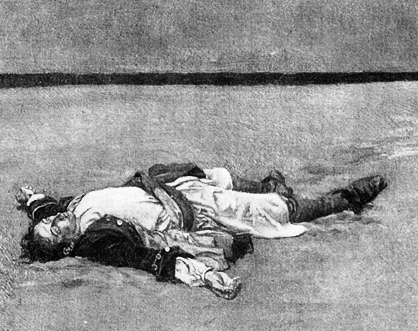
Howard Pyle, 1894
(Source: Dover's Pirates CD)
Not so Stede
and David. Rhett quickly found the
pirates’ hideaway and went in firing.
David was killed in the skirmish; the
hunters “wounded one Negroe and
an Indian.” (Tryals, vi)
Realizing the gig was up, Stede
surrendered again. He arrived back in
Charles Town two days before his men were
hanged. This time around, he was kept
under careful guard to prevent a second
escape.
Two days after the hangings, Stede came
before the vice-admiralty court to answer
for his crimes. On that Monday, he was
arraigned on two charges of “feloniously
and piratically taking” Captain Peter
Manwareing’s Francis and Captain
Thomas Read’s Fortune, as well as
cargo that these sloops carried. (Tryals,
37) Stede maintained his innocence and
pled not guilty.
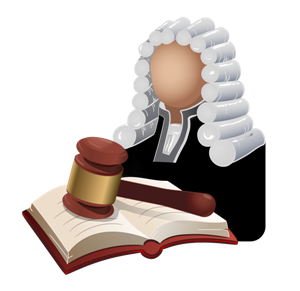 Rather than waste more
time, Judge Trott proceeded with the first
trial. The following jurors heard this
case: Henry Beaton, Thomas Bee, Timothy
Bellamy (foreman), Benjamin Dennis, George
Ducket, Claas Joor, Thomas Lamboll, John
Lee, Jonathan Main, James Mazyck, William
Sheriff, and Moses Wilson. Only half of
the jurors were serving for the first
time. The rest were sitting in judgment
for the sixth time. Bellamy, one of those
six, had also served as the foreman on
five previous trials. Rather than waste more
time, Judge Trott proceeded with the first
trial. The following jurors heard this
case: Henry Beaton, Thomas Bee, Timothy
Bellamy (foreman), Benjamin Dennis, George
Ducket, Claas Joor, Thomas Lamboll, John
Lee, Jonathan Main, James Mazyck, William
Sheriff, and Moses Wilson. Only half of
the jurors were serving for the first
time. The rest were sitting in judgment
for the sixth time. Bellamy, one of those
six, had also served as the foreman on
five previous trials.
Prosecuting attorney Hepworth opted to
focus on the part Stede played in David
Herriot’s demise, which resulted in the
loss of a witness against the pirates. As
far as Hepworth was concerned, Stede was
“answerable for that Man’s Death.” (Tryals,
37) Hepworth also highlighted Stede’s
ill-fated decision during the time in
which Thache had command of Revenge.
[S]ome People took
particular notice of the Prisoner’s
Behaviour at the time when . . . he
began to reflect upon his past Course
of Life, and was filled then with such
Horror, that he was perfectly
confounded with Shame at the many
detestable Crimes he had been guilty
of, and said, he would gladly leave
off that way of living, being fully
tired, and having got considerably by
it; but he should be ashamed ever to
see the Face of an Englishman:
therefore, if he could not get to
Spain or Portugal, where he might be
undiscover’d, he would live and die in
the same Course of Life, viz. in
Piracy and Robbery. (Tryals,
37)
Hepworth
didn’t feel a simple trial was sufficient.
After all, Stede “was the great Ringleader
. . . who . . . seduced many poor
ignorant Men . . . and ruined many poor
Wretches; some of whom lately
suffered, who to the last Breath
expressed a great Satisfaction at the Prisoner’s
being apprehended, and charged the
ruin of themselves and loss of their Lives
intirely upon him.” (Tryals, 37-38)
With that opening, the Crown’s first
witness, Ignatius
Pell, was called to the stand. Mr.
Hepworth and the attorney general
questioned him about what the pirates did
while he sailed with Stede, especially as
it pertained to Manwareing. At one point,
Judge Trott asked whether Stede was Pell’s
commander, and the witness’s response was,
“He was called our Captain to be sure.” (Tryals,
38) Later, he qualified this by saying,
“He went by that Name; but the
Quarter-Master had more Power than he.” (Tryals,
38) As far as Trott was concerned,
however, the point of fact was that Stede
“was Commander in Chief,” which meant he
was the one in charge. (Tryals, 38)
Next to testify was Captain Manwareing.
After the prosecution established that
there had been a piratical attack on his
vessel, Bonnet was permitted to ask
questions.
Bonnet. I
beg leave to ask whether you ever saw
me share among the rest.
Manwareing.
You was in the Round-House, and a
Bundle and some Pieces was brought;
and I saw you take it, and give it the
Negroe-Boy, to put into the Chest.
Bonnet.
There was several that I kept their
Shares for; but it was not mine.
Manwareing.
It was put away by your Order.
Bonnett.
Did you ever here me order any thing
out of the Sloop?
Manwareing.
Major Bonnet, I am sorry you
should ask me the Question; for you
know you did: Which was my All, that I
had in the World. So that I do not
know but my Wife and Children are now
perishing for want of Bread in New-England.
Had it been only my self, I had not
matter’d it so much; but my poor
Family grieves me. (Tryals,
39)
That response
ended Stede’s desire to pose any further
questions, and Hepworth called James
Killing to the stand. He basically
repeated what he had testified to in
earlier trials. This time, Attorney
General Allein wished to make it clear
that Stede had given orders for the
removal of cargo, and Killing said without
question, it was “Major Bonnet gave
Orders for it to be done.” (Tryals,
39)
Since Stede had no questions for Killing,
Captain Read took the stand. His
information confirmed statements made by
the previous two witnesses. Again, Stede
had nothing further to ask. The
prosecution rested and Judge Trott
informed Stede that he could now mount his
defense. Stede called “a young Man came
from North Carolina, that will say
something in my Defence.” (Tryals,
40) His name was James King. It turned out
that what the lad had to say was basically
hearsay. After listening to the testimony,
Judge Trott wondered whether “this be all
the Evidence you have.” If so, “I do not
see this will be of much use to you . . .
.” (Tryals, 40) King was dismissed.
At this point, Stede wanted to address the
court on both indictments, but Trott would
only permit him to speak on the charge for
which he was currently being tried.
. . . though I must
confess my self a Sinner, and the
greatest of Sinners, yet I am not
guilty of what I am charged with. As
for what the Boatswain says,
relating to several Vessels, I am
altogether free; for I never gave my
Consent to any such Actions: For I
often told them, if they did not leave
off committing such Robberies, I would
leave the Sloop; and desired them to
put me on shore. And as for taking
Capt. Manwareing, I assure
your Honours it was contrary to my
Inclination . . . I opposed it, and
told them again I would leave the
Sloop . . . . (Tryals, 40)
After a brief
discourse between Stede and Judge Trott,
Attorney General Allein’s closing remarks
were designed to refute Stede’s defense
and remind the jurors of his own case.
[T]he Boatswain,
who seems to bear a very great
Affection to him, yet he tells you
that he was Commander in chief among
them at the time when Capt. Manwareing
was taken. Capt. Manwareing tells
you . . . he was brought before him,
and no other, and that he delivered
his Papers to him; and he saw his
Share brought to him . . . and put
into the Chest. (Tryals,
40)
In other
words, what more proof do you need? After
considering the verdict, the jury foreman
announced that they “found . . . Stede
Bonnet alias Edwards, alias
Thomas, Guilty.” (Tryals,
41) With that, Trott adjourned court for
the day and Stede was returned to his
prison.
On Tuesday, 11 November, court reconvened
with the intention of trying Stede on the
second indictment against him. Instead, he
changed his plea to guilty. Judge Trott
postponed further business until the next
day.
When Stede appeared at the bar on
Wednesday, Judge Trott remarked on the
fact that although Stede stood guilty on
two acts of piracy, he could easily “have
been . . . convicted of eleven more
. . . .” (Tryals, 42)
Trott then proceeded to spell out the sins
that Bonnet was guilty of and, being a
biblical scholar, the judge quoted
appropriate Bible verses to bring home his
points. For example:
And consider that Death
is not the only Punishment due to Murderers;
for they are threaten’d to have
their Part in the Lake
which burneth with Fire and
Brimstone, which is the
second Death, Rev.
21.8. See Chap. 22.15. (Tryals,
42)
He also spoke
about education.
You being a Gentleman
that have had the Advantage of a
liberal Education, and being
generally esteemed a Man of
Letters . . . considering the Course
of your Life and Actions, I have just
reason to fear that the Principles of
Religion that had been instill’d into
you by your Education, have
been at least corrupted, if not
entirely defac’d, by the
Scepticism and Infidelity of
this wicked Age; and that what Time
you allowed for Study was rather
applied to the Polite Literature,
and the vain Philosophy of
the Times, than a serious Search after
the Law and Will of
God . . . . (Tryals, 42)
Trott went on
like this for a time and then spoke of
redemption before pronouncing Stede’s
death sentence.
Initially, Stede accepted his fate with “a
demeanor of calm dignity, not to say
indifference.” (History, 181) This
changed after he learned the date of his
execution, which had been set by the
governor. Now, knowing he would hang on 10
December, Stede “became unnerved.” (History,181)
Not everyone in town was happy with the
outcome of Stede’s trial. His supporters,
especially some women, favored pardoning
him. Even Colonel Rhett proposed that he
could escort Stede to London, where King
George III might weigh in on what was to
become of this gentleman turned pirate.
But those in authority, including Governor
Johnson, had had enough. The king would
not be consulted in this matter. Hanging
Stede was the perfect means for showing
others just what to expect if they even
considered stepping away from the straight
and narrow.
Still, Stede wasn’t above begging for his
life as shown in the letter he sent to the
governor.
I have presumed on the
confidence of your eminent Goodness to
throw myself after this manner at your
feet, to implore you’ll be graciously
pleased to look upon me with tender
Bowels of Pity and Compassion; and
believe me to be the most miserable
Man this day breathing; That the tears
proceeding from my most sorrowful soul
may soften your heart, and incline you
to consider my dismal State . . . [I]
therefore beseach you to think me an
object of your Mercy.
. . .
I intreat
you not to let me fall a Sacrifice to
the Envy and ungodly rage of some few
Men, who, not yet being satisfied with
Blood, feign to believe that if I had
the Happiness of a longer Life in this
World I should still employ it in a
wicked Manner . . . I heartily beseach
you’ll permit me to live, and I’ll
voluntarily put it ever out of my
power by separating all my Limbs from
my Body, only reserving the use of my
Tongue to call continually on and pray
to the Lord, my God, and mourn all my
Days in Sackcloth and Ashes to work
out Confident hopes of my Salvation,
at that great and dreadful Day when
all righteous Souls shall receive
their just rewards. (History,
181-182)
Stede was even
willing to serve an indenture for the rest
of his life, if only he were spared
dancing the hempen jig. If mercy wasn’t
possible, he did say he would “pray that
our heavenly Father will also forgive your
Tresspasses.” (History, 182) He
signed his letter,
Your Honour’s Most
miserable and Afflicted Servant Stede
Bonnet. (History, 182)
A second
missive from Stede was sent on 27
November. The recipient was said to be
Colonel William Rhett, the man who had
captured him (twice), but some wording
suggests it was sent to a third party.
My unhappy fate lays me
under a necessity of troubling you
with this letter, which I humbly beg
you will be pleased to excuse, and
with a tenderness of heart
compassionate the deplorable
circumstances I have been
inadvertently led into; and though I
can’t presume to have the least
expectations of your friendship for so
miserable a man, yet I hope your good
disposition and kind humanity will
move you to become an intercessor with
his honor the Governor, that I may be
indulged with a reprieve to stay
execution of the severe sentence I
have undergone, till his majesty’s
pleasure be known concerning me.
(Ramsay, 116 n.)
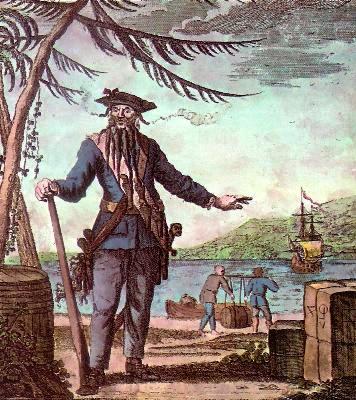 He did talk some about his
time with Thache,
claiming to have been “a prisoner on
board” and that Thache “with several of Captain
Hornigold’s company which he then
belonged to, boarded and took my sloop
from me at the island of Providence,
confining me with him eleven months[.]”9
(Ramsay, 116 n.) He swore he didn’t
participate in the pirates’ endeavors and
that he received no shares from the
captured prizes. He did talk some about his
time with Thache,
claiming to have been “a prisoner on
board” and that Thache “with several of Captain
Hornigold’s company which he then
belonged to, boarded and took my sloop
from me at the island of Providence,
confining me with him eleven months[.]”9
(Ramsay, 116 n.) He swore he didn’t
participate in the pirates’ endeavors and
that he received no shares from the
captured prizes.
. . . I can’t but confess
my crimes and sins have been too many,
for which, I thank my gracious God for
the blessing, I have the utmost
abhorrence and aversion; and although
I am become as it were a monster unto
many, yet I intreat your charitable
opinion of my great contrition and
godly sorrow for the errors of my past
life . . . (Ramsay, 116 n.)
He promised
that he had no intention of ever allowing
himself to be brought so low again and
would “follow those excellent precepts of
our holy Savior – to love my neighbor as
myself; and do unto all men whatsoever I
would they should do unto me, living in
perfect holy friendship and charity with
all mankind.” (Ramsay, 117 n.)
According to Stede, he was the one who
convinced his fellow pirates to surrender
to Colonel Rhett, but it took him “near
twenty-four hours time and trouble to do
after the engagement was over, when I knew
what the two sloops were that Colonel
Rhett commanded.” (Ramsay, 117 n.) Thus
Stede was the one who had spared everyone
more bloodshed and prevented some of the
pirates from carrying out their threat to
blow up Revenge should Rhett and
his men board the pirate ship. He was
certain that Rhett would so testify should
Stede receive his reprieve and be taken to
England.
He did understand that his escape “might
justly increase and aggravate his honor
and” those in authorities. (Ramsay, 117
n.) He chalked up his doing so to the fact
that anyone in his dire circumstances
would want “to evade, if possible, so
horrid a sentence, by endeavoring to get
to some private settlement and continue
there till my friends could apply home for
his majesty’s gracious pardon.” (Ramsay,
117 n.)
As they say, the rest is history. The
governor did not stay the execution; nor
did he acquiesce and allow anyone to put
Stede’s case for leniency before the king.
A pirate was a pirate, and pirates needed
to be punished. Hence, on 10 December
1718, Stede Bonnet breathed his last. He
was carted, under close
guard, to the gallows at White Point.
. . . Approaching the gallows, Bonnet
clutched a wilted bouquet of flowers .
. . in his shackled hands. (Moss,
174-175)
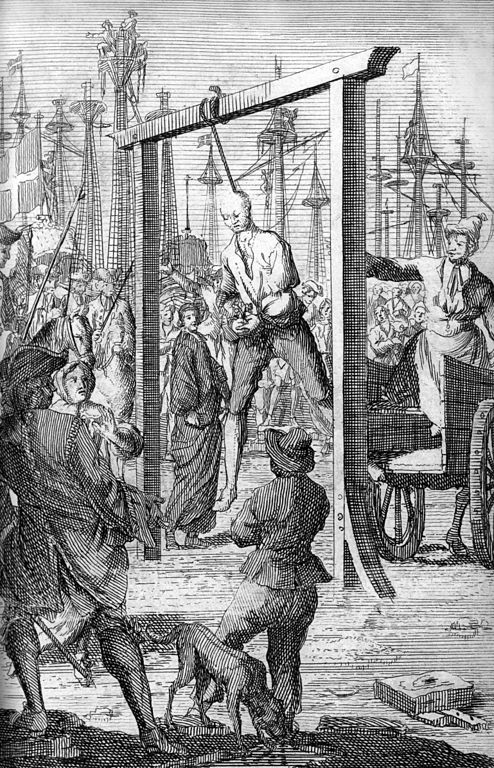
Majoor Stede Bonnet
Gehangen
(The Hanging of Major Stede Bonnet)
Engraving from 1725 Dutch edition of
Captain Charles Johnson's A
General History of the Pyrates
(Source: Wikimedia
Commons)
As for those he left behind, he “never
expressed feelings of regret or sorrow.”10
(Moss, 175)
The impression often given of Stede Bonnet
is of a man who was inept at pirating, yet
in 2008, Forbes included him in
their list of “The 20 Highest-Earning
Pirates.” His takings equated to $4.5
million (2008 dollars), making him number
fifteen. He surpassed Richard Worley,
Charles Vane, Edward Low, John Rackham
(Calico Jack), and James Martel.
Notes:
6. What
happens when a person is guilty of one
crime and not the other? These were the
verdicts rendered at Boyd's two trials.
In this instance, he was sentenced to
death. At some point thereafter, he was
given a reprieve and did not dance the
hempen jig.
Nor was he the only one spared, despite
being found guilty. Twenty-nine were
destined for the hangman's noose; only
twenty-two met that fate. The reprieved
were Brierly, Carman, Levit, Livers,
Ridge, and Wilson.
7. Nathaniel
Partridge would lose his job because of
the escape.
8. Although
Tookerman eluded authorities for his
part in Stede’s escape, he landed in
jail the following March because stolen
evidence was found in his possession. He
later escaped and made his way to
Barbados. There, he went on the account.
Captured in Port Royal for visibly
supporting the Jacobite cause, he was
taken to England to stand trial. Instead
of being prosecuted, the Court of King’s
Bench released him. Believing he had
been falsely arrested, he sued Admiral
Edward Vernon, who had signed the
orders for his arrest and transport from
Jamaica. Tookerman felt £10,000 was just
compensation; Vernon was going to ignore
the whole affair until his lawyers
advised otherwise. Negotiations were
conducted and Tookerman walked away with
£800 instead.
9. Although captured
first, it’s interesting to note that
Stede outlasted his former “partner,”
Edward Thache. Lieutenant Robert Maynard
and his men caught up to Blackbeard on
22 November 1718. When the ensuing fight
ended, he was dead, having suffered
“five Shot in him, and 20 dismal Cuts in
several Parts of his Body.” (Brooks,
546)
10. Mary Bonnet, his
wife, lived until 1750. Her estate was
shared among their surviving children:
Edward, Stede, and Mary.
Resources:
“The
Affidavit of Capt. Peter Manwareing” in The
Tryals of Major Stede Bonnet. Printed for
Benj. Cowse, M. DCC.XIX., 50.
“America
and West Indies: January 1718, 1-13” in Calendar
of State Papers Colonial, America and West
Indies: Volume 30, 1717-1718. His
Majesty’s Stationery Office, London, 1930. (Jan.
6. 298.)
“America
and West Indies: May 1718” in Calendar
of State Papers Colonial, America and West
Indies: Volume 30, 1717-1718. His
Majesty’s Stationery Office, London, 1930. (May
31. Bermuda. 551)
“America
and West Indies: June 1718” in Calendar
of State Papers Colonial, America and West
Indies: Volume 30, 1717-1718. His
Majesty’s Stationery Office, London, 1930. (June
18. Charles Towne, South Carolina. 556.)
“America
and West Indies: October 1718,” in Calendar
of State Papers Colonial, America and West
Indies: Volume 30, 1717-1718. His
Majesty’s Stationery Office, London, 1930. (Oct.
21. Charles town, South Carolina. 730.)
Baker, Daniel R. “Stede Bonnet: The Phantom
Alliance,” The Pyrate’s Way (Summer
2007), 21-25.
Bialuschewski, Arne. “Blackbeard
off Philadelphia: Documents Pertaining to the
Campaign against the Pirates in 1717 and 1718,”
The Pennsylvania Magazine of History and
Biography v.134: no. 2 (April 2010),
165-178.
“Boston,” The Boston News-Letter 16 June
1718 (739), 2.
British Piracy in the Golden Age: History and
Interpretation, 1660-1730 edited by Joel
H. Baer (volume 2). Pickering & Chatto,
2007.
Brooks, Baylus C. Quest for Blackbeard: The
True Story of Edward Thache and His World.
Independently published, 2016.
Butler, Nic. “The
Watch House: South Carolina’s First Police
Station, 1701-1725,” Charleston Time
Machine (3 August 2018).
Cooper, Thomas. “An Act
for the More Speedy and Regular Trial of
Pirates. No. 390.” in The Statutes at
Large of South Carolina. Printed by A. S.
Johnston, 1838, 3:41-43.
Cordingly, David. Under the Black Flag: The
Romance and the Reality of Life Among the
Pirates. Random House, 1995.
Dolin, Eric Jay. Black Flags, Blue Waters:
The Epic History of America’s Most Notorious
Pirates. Liveright, 2018.
Downey, Christopher Byrd. Stede Bonnet:
Charleston’s Gentleman Pirate. The History
Press, 2012.
Fictum, David. “'The
Strongest Man Carries the Day,' Life in New
Providence, 1716-1717,” Colonies, Ships,
and Pirates (26 July 2015).
Hahn, Steven C. “The
Atlantic Odyssey of Richard Tookerman:
Gentleman of South Carolina, Pirate of
Jamaica, and Litigant before the King’s Bench,”
Early American Studies 15:3 (Summer 2017),
539-590.
History
of South Carolina edited by Yates Snowden.
Lewis Publishing, 1920, 1:173-182.
“The Information of Capt. Peter Manwareing” in The
Tryals of Major Stede Bonnet. Printed for
Benj. Cowse, M. DCC. XIX., 49.
“The Information of David Herriot and Ignatius
Pell” in The Tryals of Major Stede Bonnet.
Printed for Benj. Cowse, M. DCC. XIX., 44-48.
Johnson, Charles. A
General History of the Pyrates. T. Warner,
1724.
Logan, James. “James
Logan letter to Robert Hunter, October 24,
1777." Historical Society of Pennsylvania
Discover.
(Special
note, the date of the entry is misleading as the
date of the letter [viewable and downloadable here]
is 24 8 1717 or 24 August 1717. James Logan was
deceased in 1777.)
The London
Gazette. Issue
5573 (14 September 1717), 1.
Marley, David F. “Thatch, Edward, Alias
‘Blackbeard’ (fl. 1717-1718),” Pirates of
the Americas. ABC-CLIO, 2010, 2:787-799.
Malesic, Tony. E-mail posting on PIRATES about
Richard Tookerman, 26 September 2001.
Moss, Jeremy R. The Life and Tryals of the
Gentleman Pirate, Major Stede Bonnet.
Köehler, 2020.
Moss, Jeremy. “Stede
Bonnet, Gentleman Pirate: How a Mid-life
Crisis Created the ‘Worst Pirate of All Time,’”
History Extra (4 January 2023).
“Philadelphia, October 24th,” The Boston
News-Letter 11 November 1717 (708), 2.
“A Prefatory Account of the Taking of Major
Stede Bonnet, and the other Pirates, by the two
Sloops under the Command of Col. William Rhett”
in The Tryals of Major Stede Bonnet.
Printed for Benj. Cowse, M. DCC. XIX., iii-vi.
Ramsay, David. Ramsay’s
History of South Carolina: From Its First
Settlement in 1670 to the Year 1808. W. J.
Duffie, 1858.
“Top-Earning
Pirates,” Forbes (19 September 2008).
The
Tryals of Major Stede Bonnet, and Other
Pirates. Printed for Benjamin Cowse,
MDCCXIX.
Woodard, Colin. The Republic of Pirates:
Being the True and Surprising Story of the
Caribbean Pirates and the Man Who Brought Them
Down. Harcourt, 2007.
Copyright ©2024 Cindy Vallar
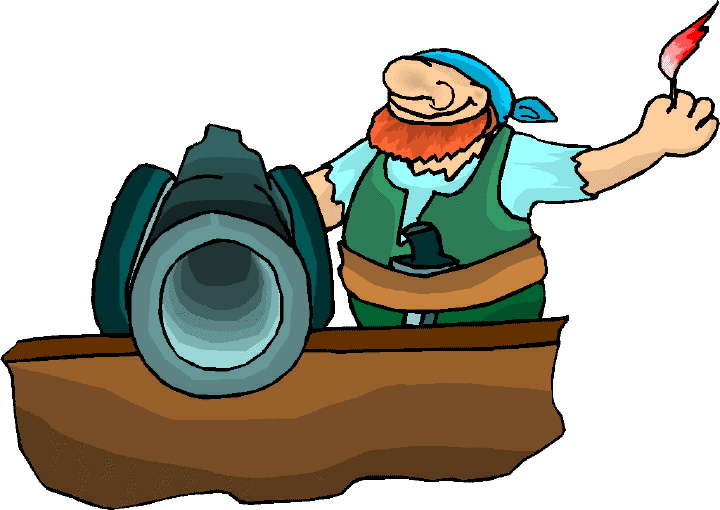
Click to contact me
Background image compliments
of Anke's Graphics |

